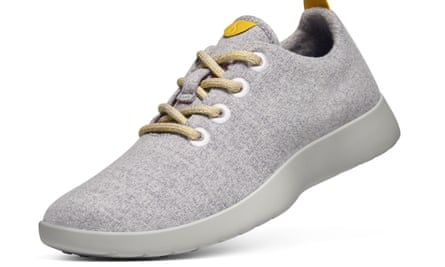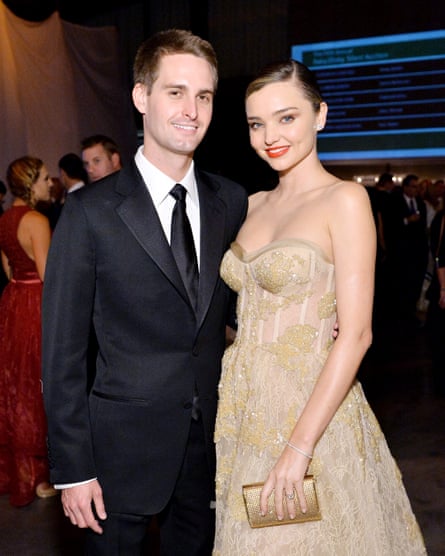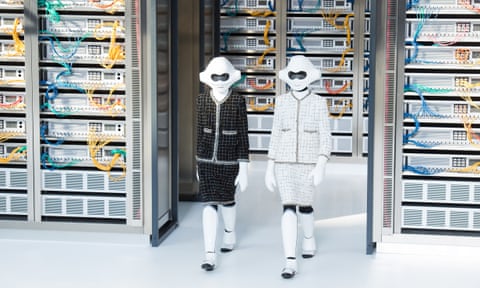The strangest thing about Bulletproof Coffee isn’t stirring a pellet of grass-fed butter and a dollop of coconut oil into your morning cup and calling it breakfast, weird though that is to swallow. No, what makes Bulletproof really unusual is the trajectory the trend has followed. The craze started with the Silicon Valley entrepreneur Dave Asprey, who turned the alleged weight-shedding, brainpower-enhancing benefits of caffeine turbocharged with fat into a mini-empire. He took the idea to Santa Monica, where he opened a cafe. David Beckham started dropping in.
The Guardian’s product and service reviews are independent and are in no way influenced by any advertiser or commercial initiative. We will earn a commission from the retailer if you buy something through an affiliate link. Learn more.
From there, it spread to fashion. Vogue has called it “the new green juice”; at the recent fashion shows, it was on the way to replacing espresso and egg-white omelette as the standard front-row breakfast. Dan Brown, whose novels surely give him zeitgeist bragging rights, has been telling interviewers how 4am writing sessions for his latest book, Origin, were fuelled by Bulletproof. Asprey’s ready-made, cold-pressed Bulletproof products are about to go on sale in Whole Foods Market stores, at which point the journey from Silicon Valley quirk to bona fide hipster lifestyle trend will be complete.

The direction of travel of trends outwards from Silicon Valley was visible when Duncan Selbie, the chief executive of Public Health England, warned of the “perils of sitting at your desk” all day and called for employers to introduce “walking meetings” to reduce stress and back pain among the workforce. The pioneer of the walking meeting was Steve Jobs and the habit is so deeply ingrained in Silicon Valley culture that the Frank Gehry-designed Facebook headquarters features four hectares of wifi-enabled wildflower meadows, with milkshake stands dotted along paths. On Prince Street in New York’s Soho, the newest boutique to open alongside Marc Jacobs and Ralph Lauren is evidence of the first true fashion trend to originate in Silicon Valley. Allbirds, the woollen sneakers that are already de rigueur at Googleplex, are spreading to “a creative class of people … architects, interior designers, entertainers in music and acting”, as the San Francisco-based cofounder Joey Zwillinger told the New York Observer.
“Free sushi, massage chairs, toilet seats that heat up – employees at top companies here live like celebrities,” says Ravi Belani, director of the Alchemist, a startup accelerator and lecturer in entrepreneurship at Stanford University. Two hundred miles from the Sierra Nevada, where gold-rush fortunes were made overnight in the 19th century, and 500 miles from the Los Angeles hills where stars were born in the 20th century, Silicon Valley has become the 21st-century Hollywood. If you want to get rich and famous fast, this is where you need to be. “It’s not like this place is full of beautiful people,” says Bebe Chueh, the cofounder of the law firm Atrium, which specialises in helping startups, “but you can accelerate your career here. You don’t need to wade for years through a company structure. You can make it all happen when you are 22.” Anjula Acharia, who, as a celebrity manager and a partner in Trinity Ventures, bestrides the worlds of Hollywood and tech, says that, in the tech sphere, “people are still wearing anoraks. They do still look sort of geeky. This is definitely not New York or London in terms of style. But they have become the global elite. People see that, and they want to be part of that world.”
“Twenty years ago, when we started lastminute.com, tech was totally weird and geeky,” remembers the cross-bench peer and Twitter board member Martha Lane Fox. “At that point, people were still wondering if the internet was really going to be a thing. As a relatively young woman wanting to be involved in it, I struck people as bizarre. And, although there are still not nearly enough women, that perception has changed. There has been a huge cultural shift.”

“Revenge of the nerds” is how Troy Carter – the former manager of Lady Gaga and now a Silicon Valley venture capitalist – describes this change. Last year, Carter told Time magazine about leaving a barbecue in Silicon Valley with a feeling that “the power was shifting”. The new stardust glinting from the glass offices of Silicon Valley has not gone unnoticed by the fashion world. Virgil Abloh, the founder of Off-White, a Kanye West collaborator and probably the hottest name in the fashion industry right now, attended September’s iPhone X launch in the company of his friend Jony Ive, the chief design officer of Apple, and Angela Ahrendts, senior vice-president of retail at Apple, who was wearing a pink lace Burberry trench (Ahrendts was CEO of Burberry until 2014).
In the same month, the San Francisco-born, New York-based fashion designer Alexander Wang – who, until recently, liked to hold up Ralph Lauren’s empire as his aspiration – began to talk about wanting to be more like Amazon. “Obviously, the big opportunity is digital. I feel that today there is still not a single lifestyle brand that operates like a tech company,” he said. “Imagine a creative director today for a brand like Amazon. What would that look like?” Karl Lagerfeld has built Chanel into a pop-cultural powerhouse on the back of his instinct for the modern and has made gorgeous, aspirational set design a fashion-week calling card – a Paris street by night, the gardens of Versailles. Last October, he built a datacentre for his show, with the colours of tweed suits picked out in tangles of Ethernet cables.
Silicon Valley’s ascent to glamour can be crudely measured in the intermarriage with models (Snapchat’s Evan Spiegel to Victoria’s Secret’s Miranda Kerr, in May), ostentatious parties (Sean Parker’s fantasy-themed redwood forest wedding, reported to have cost $10m) and glossy magazine covers (Spiegel was called “the first Silicon Valley sex symbol” by GQ after landing the cover of Italian Vogue Uomo two years ago). Not to mention the films (The Social Network, 2010), the booming roll-call of bold-faced name investors (Jay-Z in Uber, Ashton Kutcher in Airbnb) and, er, interplanetary ambitions (Elon Musk is only dropping by on his way to Mars). At the core of all this, says Lane Fox, is the new reality that “tech is at the centre of who we are – and that is true for celebrities as well. Managing social media is a huge part of being a model or a pop star now, so, in a way, they are stars of tech.”

The financial crisis played its part in Silicon Valley’s Hollywood makeover. “After 2008, a lot of the Ivy League grads who would have gone to Wall Street to make money started to come to Silicon Valley instead. There was a new sexiness about being an entrepreneur,” says Belani. “There have been negative imports that have come with that: a kind of bro culture, or fraternity culture, that arrived with that intake,” he adds. Chueh has seen a physical and cultural migration since she moved to San Francisco in 2011. “Gradually, the ecosystem has moved from Cupertino, where the culture was kind of hardcore geeky, to San Francisco, where it is more about web applications and tech-enabled ideas than it is about hardware and semiconductors.” Chichi members’ clubs have sprung up in the city: the Battery in 2015, the Modernist this year. The size of Silicon Valley egos have been mapped, through the last decade, in the pages of the architecture journals that have tracked an arms race of starchitect-designed offices. The Airbnb headquarters features a replica of the war room from Dr Strangelove. The new Apple Park spaceship has grandeur on a scale to rival the pharaohs’ pyramids.
Silicon Valley has shaped a new culture in which work looks like play (ping-pong tables in reception, bean bags in W1A), but in which being off duty is frowned upon, even at weekends. “This is rooted in the brutal reality that, when you run a website, it’s always on,” says Lane Fox. “It’s not like a shop. You don’t get to close it.” Combined with the sense of mission that is the Silicon Valley creation myth, this has bred a workaholic culture, which has become a badge of honour. “The idea here is that work and play are one,” says Chueh. “Work isn’t something you go to from nine to five to get a paycheck. It’s an extension of your passion.”
Silicon Valley is a driving force behind a boom in veganism, powered by enthusiasm for healthy, sustainable faux-meat
The working hours take their toll, and while early startup culture was fuelled by pizzas laid on for team all-nighters, Silicon Valley has gradually absorbed the wellness fixation of its native California. Bowls of free M&Ms have been replaced by meditation pods. At Apple Park, fruit from the 9,000 drought-resistant trees will be harvested for use in the canteen, which will serve 14,000 lunches a day. In parallel with the keto-diet and Bulletproof enthusiasts, Silicon Valley is a driving force behind a boom in veganism, powered by enthusiasm for the new frontier of healthy, sustainable faux-meat products. “It’s cool now to be vegan,” says Belani.
In contrast to the enthusiasm for radical diets and alternative work spaces, fashion in Silicon Valley is noticeably low key. Time spent on sartorial decisions is time that could be better spent working. Form follows function. “You have to look at the weather to understand the dress code here,” says Chueh. “It can be cold in the early morning and hot in the afternoon, so it’s all about layers: a T-shirt and a hoodie. On the other hand, there are no real seasons. So, unlike in, say, Boston, your wardrobe is pretty much the same all year round.”
“I dress totally differently when I am in Silicon Valley as opposed to Hollywood,” says Acharia-Bath. “For instance, no one wears heels here, so, if you do, it becomes, like, a thing.”
The flat-shoe, jeans and backpack uniform, technically unisex, but with a masculine, grey-marl slant, holds up a mirror to a very male world. “This is still an industry so dominated by men, especially at the top level,” says Lane Fox. Which should be enough to give us pause as this culture grows in influence, setting the agenda in ever more arenas. And just as the maverick, anarchic mindset that can be exciting and progressive in startup culture becomes something more dangerous as the big beasts of tech control and shape every aspect of our lives, from the news we read on Facebook to the private thoughts that are open secrets thanks to Google’s search history, Silicon Valley’s radical attitude to nutrition has the potential to act as a gateway drug to more extreme versions of biohacking. Ambrosia is a San Francisco startup that offers transfusions of young people’s blood, for £6,200 a session, to a client list with a median age of 60. Better sleep and an improvement in some early indicators for cancer and Alzheimer’s are among the benefits Ambrosia claims from early research (although the scientific community has been cautious about the results to date).
Yes, this sounds ridiculous. But then, there was a time – not so long ago – when you might have been sceptical about the prediction that, by 2015, the average British child would spend less time outdoors than a high-security prisoner (less than an hour on average, whereas a lifer should get 60 minutes, under UN guidelines). Or that one in three British preschool children would own their own iPad. But what came out of Cupertino changed all that. Silicon Valley is the new Hollywood in many ways, but with one crucial difference: this time, it’s not just make-believe.

Comments (…)
Sign in or create your Guardian account to join the discussion